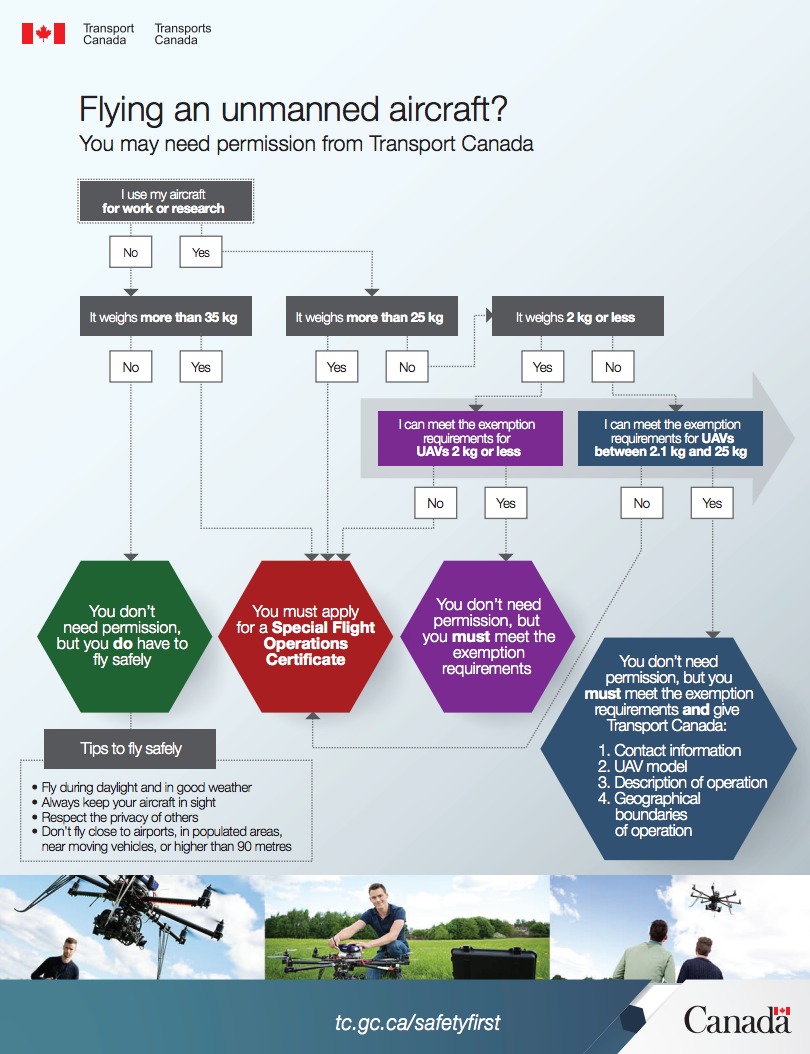
Robohub.org
Transport Canada releases new framework for governing UAV operations
 Earlier this month, Transport Canada announced that commercial operators will soon be able to benefit from two exemptions from the general Special Flight Operations Certificate (SFOC) requirement. Today, Transport Canada published an infographic on its site detailing the new exemptions. Here’s a breakdown of the new framework…
Earlier this month, Transport Canada announced that commercial operators will soon be able to benefit from two exemptions from the general Special Flight Operations Certificate (SFOC) requirement. Today, Transport Canada published an infographic on its site detailing the new exemptions. Here’s a breakdown of the new framework…
When do you need an SFOC?
An SFOC is required if you are operating a UAV that weighs more than 35kg for any purpose. Operators must also obtain an SFOC if they are flying for “work or research” purposes and they do not meet the requirements of either of the new exemptions (for instance, if the UAV weighs more than 25kg). Before outlining the exemptions, it is important to highlight that the “research” criteria reflects an expansion of the general SFOC requirement.
When can you avoid an SFOC?
If a UAV is not being used for “work or research” and it weighs 35kg or less, an SFOC is not required, however operators are still expected to engage in safe practices. Transport Canada has enumerated “safety tips” such as: flying during daylight, within sight; avoiding airports, populated areas and moving vehicles; and not exceeding an altitude of 90 meters.
Those operating UAVs for “work or research” may be able to benefit from two exemptions. The first of these applies to operators flying UAVs weighing less than 2kg. The requirements that the operator must satisfy to qualify for this exemption include: age restrictions, carrying liability insurance, flying during daylight in direct line of sight, and flying at a distance of at least 30 metres from people, animals, buildings and vehicles not involved in the operation.
The second exemption applies to operators flying UAVs weighing between 2kg and 25kg for “work or research” purposes. This exemption features a more stringent spin on the requirements that apply to UAVs under 2kg (i.e. staying at least 150 metres away from people, animals, buildings and vehicles not involved in the operation). Additional criteria includes: developing and adhering to landing and recovery procedures and having a fire extinguisher on site.
Reflecting on the new exemptions, Brendan Schulman, a New York attorney representing commercial operators commented that “Canada’s new regulatory framework reflects a thoughtful risk-based approach and recognizes that at low weights and low altitudes, commercial drones do not pose serious safety risks. I hope our regulators in the United States take note of this alternative path to the future regulation of commercial drones.”
tags: c-Politics-Law-Society, Canada, cx-Aerial, drone policy, drone regulation




